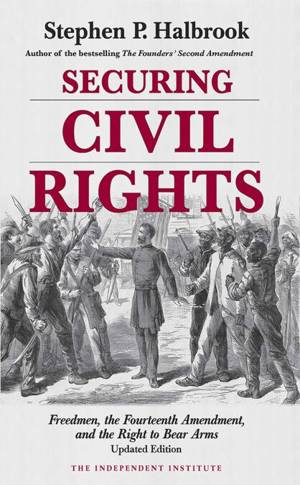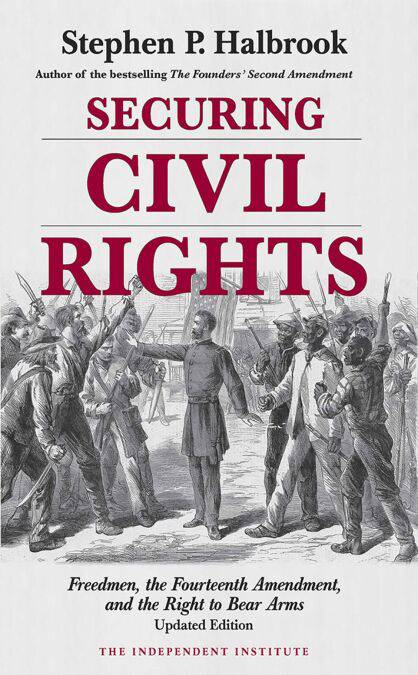
- Retrait gratuit dans votre magasin Club
- 7.000.000 titres dans notre catalogue
- Payer en toute sécurité
- Toujours un magasin près de chez vous
- Retrait gratuit dans votre magasin Club
- 7.000.0000 titres dans notre catalogue
- Payer en toute sécurité
- Toujours un magasin près de chez vous
Securing Civil Rights EBOOK
Freedmen, the Fourteenth Amendment, and the Right to Bear Arms
Stephen P. Halbrook
Ebook | Anglais
11,17 €
+ 11 points
Format
Description
Stephen Halbrook's groundbreaking study of freed slaves and the right to bear arms in the aftermath of the Civil War, cited in Supreme Court cases, now with a new foreword by Robert J. Cottrol.
What did it mean to take civil rights seriously—especially the “right to bear arms”—in the years following the abolition of slavery? By quoting legislative debates, Congressional hearings on Ku Klux Klan violence, and newspapers and law books of the time, constitutional scholar Stephen Halbrook shows that both supporters and opponents of the Fourteenth Amendment (1868) believed that it protected all Bill of Rights guarantees—especially the Second Amendment—from infringement by the states.
From the Freedmen’s Bureau Act of 1866 to the Supreme Court’s decision in United States v. Cruikshank (1876), Halbrook paints a vivid portrait of a political and legal system grappling with the true meaning of civil rights.
“Trusting ex-slaves to own firearms was, by any definition, the cutting edge in true belief in civil rights,” Halbrook writes. “It remains to be seen whether contemporary society will accommodate the same rights of the freedmen that the Framers of the Fourteenth Amendment sought to guarantee.”
Although Halbrook concentrates on the right to keep and bear arms, he also includes a comprehensive analysis of the general topic of the relationship between the Bill of Rights and the state governments after the ratification of the Fourteenth Amendment.
Cited by both the U.S. Supreme Court in its historic landmark decision in the McDonald case (2010) and the Washington Supreme Court in State of Washington v. Christopher William Sieyes case (2010) as the leading account of the relationship between the Second Amendment and the states during Reconstruction, Halbrook’s insightful narrative will help a larger audience better understand why earlier generations of Americans viewed the right to bear arms as essential for securing civil rights.
What did it mean to take civil rights seriously—especially the “right to bear arms”—in the years following the abolition of slavery? By quoting legislative debates, Congressional hearings on Ku Klux Klan violence, and newspapers and law books of the time, constitutional scholar Stephen Halbrook shows that both supporters and opponents of the Fourteenth Amendment (1868) believed that it protected all Bill of Rights guarantees—especially the Second Amendment—from infringement by the states.
From the Freedmen’s Bureau Act of 1866 to the Supreme Court’s decision in United States v. Cruikshank (1876), Halbrook paints a vivid portrait of a political and legal system grappling with the true meaning of civil rights.
“Trusting ex-slaves to own firearms was, by any definition, the cutting edge in true belief in civil rights,” Halbrook writes. “It remains to be seen whether contemporary society will accommodate the same rights of the freedmen that the Framers of the Fourteenth Amendment sought to guarantee.”
Although Halbrook concentrates on the right to keep and bear arms, he also includes a comprehensive analysis of the general topic of the relationship between the Bill of Rights and the state governments after the ratification of the Fourteenth Amendment.
Cited by both the U.S. Supreme Court in its historic landmark decision in the McDonald case (2010) and the Washington Supreme Court in State of Washington v. Christopher William Sieyes case (2010) as the leading account of the relationship between the Second Amendment and the states during Reconstruction, Halbrook’s insightful narrative will help a larger audience better understand why earlier generations of Americans viewed the right to bear arms as essential for securing civil rights.
Spécifications
Parties prenantes
- Auteur(s) :
- Editeur:
Contenu
- Nombre de pages :
- 264
- Langue:
- Anglais
Caractéristiques
- EAN:
- 9781598131666
- Date de parution :
- 03-03-22
- Format:
- Ebook
- Protection digitale:
- Adobe DRM
- Format numérique:
- ePub

Les avis
Nous publions uniquement les avis qui respectent les conditions requises. Consultez nos conditions pour les avis.






